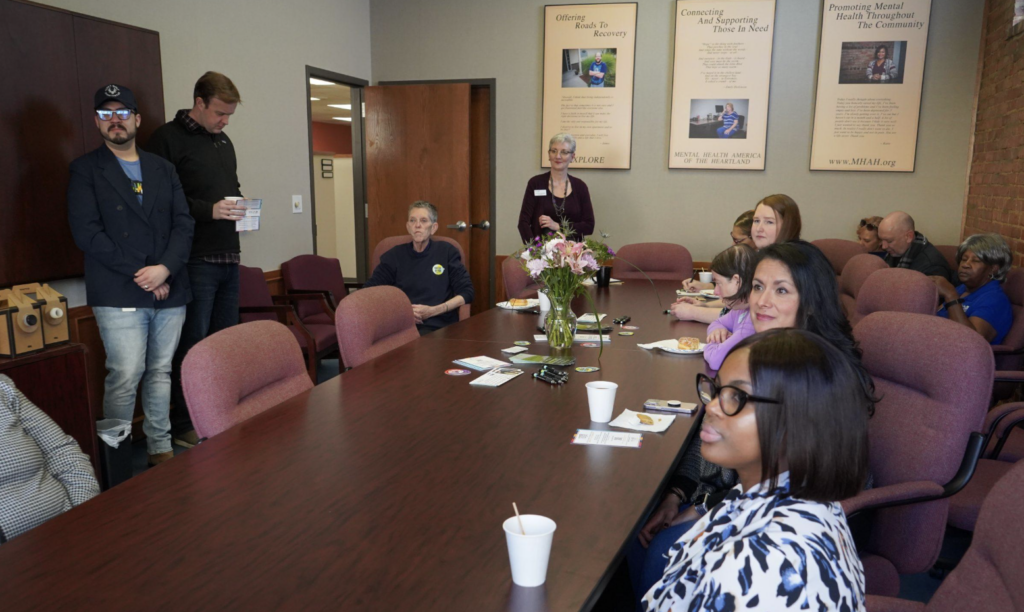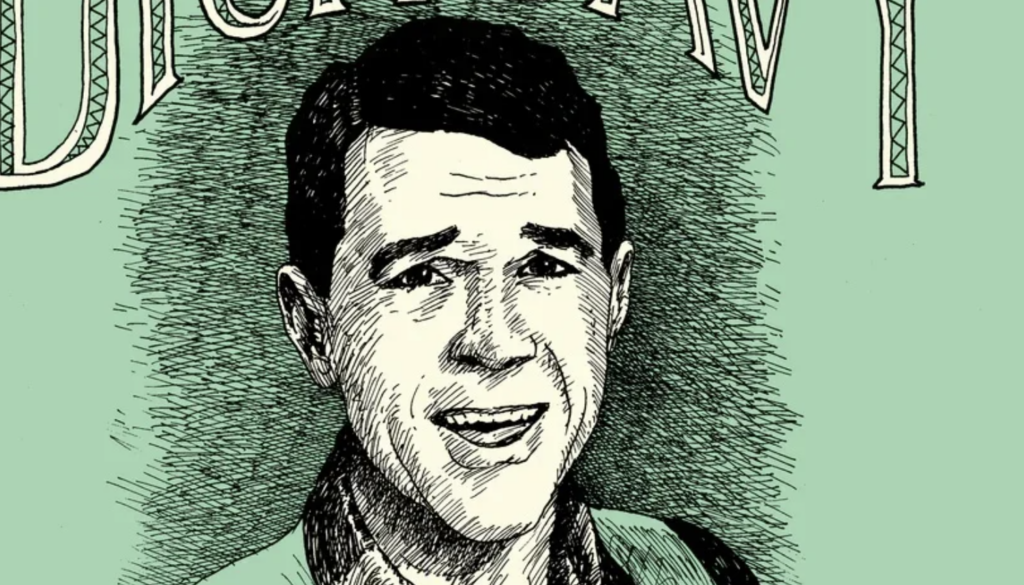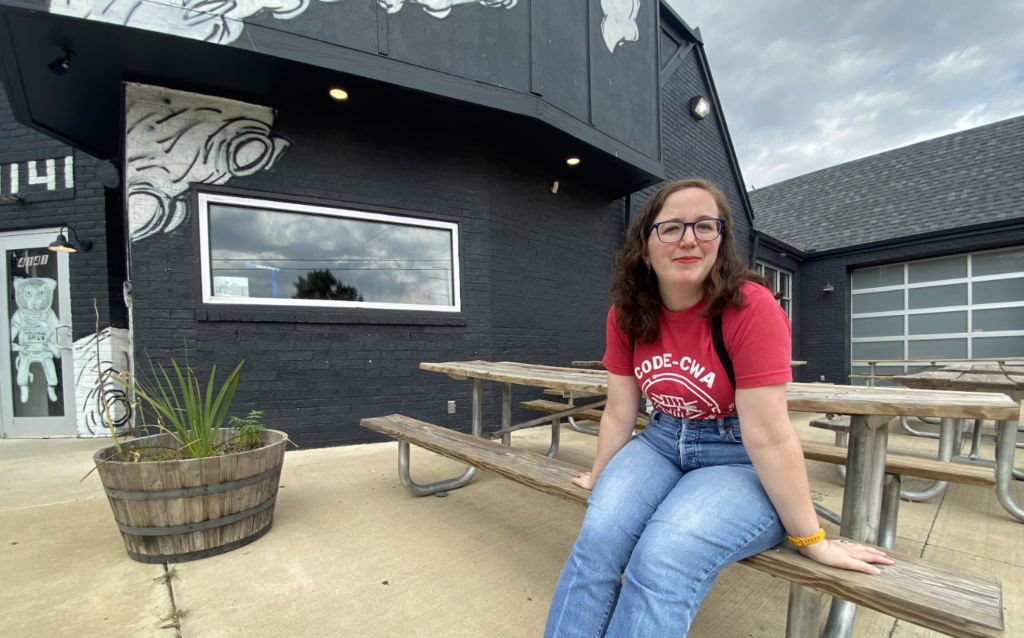Dr. Taylor Byas’ I Done Clicked My Heels Three Times wins Maya Angelou Book Award
On October 5, Taylor Byas was named winner of the third annual 2023 Maya Angelou Book Award during the Writers for Readers literary event, beating out over 100 other authors. The award comes with a $10,000 stipend as well as a book tour, conducted by Byas, of six Missouri universities that participate in the award.
Winning this award has truly been a full-circle moment for Byas. During her Ph.D. program, Angelou was one of the Black women writers that she spent a large amount of time studying.
“To even be considered for this award was kind of mind-boggling in that way. And then to win the award, I think as writers we’re often searching for those small bursts of encouragement, those things that kind of push us forward and help us keep going and to keep writing,” she says.
“This has just been the biggest affirmation that I’m doing the important work, that I am contributing to that legacy, and that ancestry that I hope to be.”
The title, I Done Clicked My Heels Three Times, is a gesture to the NAACP award-winning film, The Wiz, a film that inspired Byas through the early life lessons that the movie had taught her as a child. The title is a portrayal of her journey home, recollecting many of the memories that the Windy City bestowed upon her.
“To declare that I have already done it is to say that the book itself is this gesture of returning home, this gesture of finding a way back.”
Through the use of various forms of poetry, Byas takes readers on a journey through her upbringing as a Black woman in the Southside of Chicago. Her steadily crafted storytelling is a gateway into the life of the inner-city, sharing the intersection between family, spirituality, and maneuvering through one of the country’s most complicated metros.
The work for this fine-tuned collection of poems did not begin when Byas finally put pen to paper. It was rather set into motion when she was a child, living out the experiences that she portrays in her book.
She jumps between many of the joyful, but also sorrowful moments that she has undergone during her childhood up into her adult life. One prominent theme has always remained the same, however: Ties to her hometown.
“Chicago I think, even as I’ve moved away from it and as I’ve left it, as the book kind of explores, Chicago continues to show up in my life in these really interesting ways,” she says.
“Whether it’s the city itself, whether it’s the lessons that I took from it, whether it’s the wounds that I got in Chicago that kind of resurface and show up in relationships later on, there are all of these different ways I think that the sections explore how Chicago keeps kind of returning and showing up in my life.”
Drawing upon The Wiz, Byas even used names of different songs that the highly acclaimed cinema features for her various section titles, shifting moods throughout her poetry.
“I think there’s something about that narrative that really spoke to me, and I think runs parallel to my own journey in a lot of ways,” she says.
Her book is broken up into seven sections, each allowing the reader to step into her shoes as she shares crucial moments of her life that have molded the identity that she carries today.
She opens up the first section with a sonnet about the South Side, her home, and a place that she holds near and dear to her heart. Taking the reader through the stretch of roads and neighborhoods where she spent the majority of her time as a child sets the stage and tone for the reader as they delve into the 300-plus page walkthrough of her life.
“That first poem I think is a perfect sort of snapshot of what Chicago is for the entirety of the book. There’s tenderness, there’s danger, there’s sound, there’s worry, but there is love,” Byas says. “All of those things kind of coexist, and I thought that was sort of a great way to set the stage of Chicago for the book.”
Throughout the entirety of the book, Byas continues to draw back to the area with one sonnet in each of the seven sections.
“I also really love that the sonnets get broken up throughout the book in that way because they become kind of these anchors, but also these refrains of Chicago showing back up, kind of as a memory, kind of as a ghost, this person that keeps returning,” she says. “Chicago becomes something bigger and more than just a place. It becomes kind of characterized.”
The idea for her book initially sprouted while she was in her doctorate program. After careful time and consideration between her and her colleagues, she printed the last remaining words on paper, knowing that her work was complete.
“I would have never gotten the book to where it is, and I think this is the best version of the book, if I didn’t have people who were kind of like yes, but let’s think about this.”
While she wrote the book predominantly for her own personal interest, Byas is hopeful that the publication, along with the awards that she has received, will serve as a leading example for Black women writers who live similar lives that she has.
“I hope that Black women writers and Black women youth will come to this book and see that their lives and their stories, the every day, their cities, their families, those stories are important and they matter,” she says.
Looking back to her grade school days, Byas recalls some of the different publications that she was assigned, none of which mirrored who she was as a young Black girl in a hustle and bustle city.
“I know growing up and being assigned all of these books and things in school, and not seeing myself kind of reflected back in the stories, I know what it did to me,” she says. “I wonder what my life would have looked like, or my writing career if I had written earlier or more seriously, if I had seen myself in a lot of those pages.”
“I want them to come to this story and see parts of their own lives, parts of their own cities, family members that they recognize.”
Not only is she paving the way for future young Black writers, but she is also tearing down barriers that surround the city of Chicago. She hopes that her transparent representation of the city proves to readers that, despite the many stigmas that stain the city, Chicago and its people are much like other urban cities and even rural communities.
“I wanted Chicago to be seen as a city that’s just as complex as any other city. Our cities all have their issues, they all have their quirks about them, and they all have their things that they love and we adore,” she says. “I wanted this book to be a sort of counter-narrative to a lot of what the media puts forward about Chicago, which is, I think, heavily focused on its violence.”
Her play on words exemplifies what it means to be a Black Chicago citizen, and ultimately humanizes the city as a whole.
“I think Chicago becomes kind of human in a way, and I think that the speaker of the poems, which is a version of myself, is seen as this complex individual who is grappling with her love for and her hatred for some of the things that Chicago has taught her,” Byas says.
While she has seen success and recognition for her publication, I Done Clicked My Heels Three Times, the award-winning book is not a stopping point for Byas. She has multiple projects in the works as she continues to make her mark as a young, up-and-coming author.
One thing that she has in store is her second book, Resting Bitch Face, a look into how Black women navigate through life in our country’s patriarchy, which will also be published by Soft Skull Press in 2025. She is also currently working as an assistant features editor for The Rumpus, as well as an acquisitions poetry editor for Variant Literature.
“Sometimes, there’s this question of, ‘Are the things that I’m writing about big enough?’ ‘Are the things that I’m writing about important enough?’ Here I am writing about the Southside of Chicago and what it’s like to be a Black woman, what it’s like to move away from home and having to redefine that, and someone saw the value in that story, and someone saw the importance of that story, not only being in the world, but being awarded and shared more widely,” she says.






